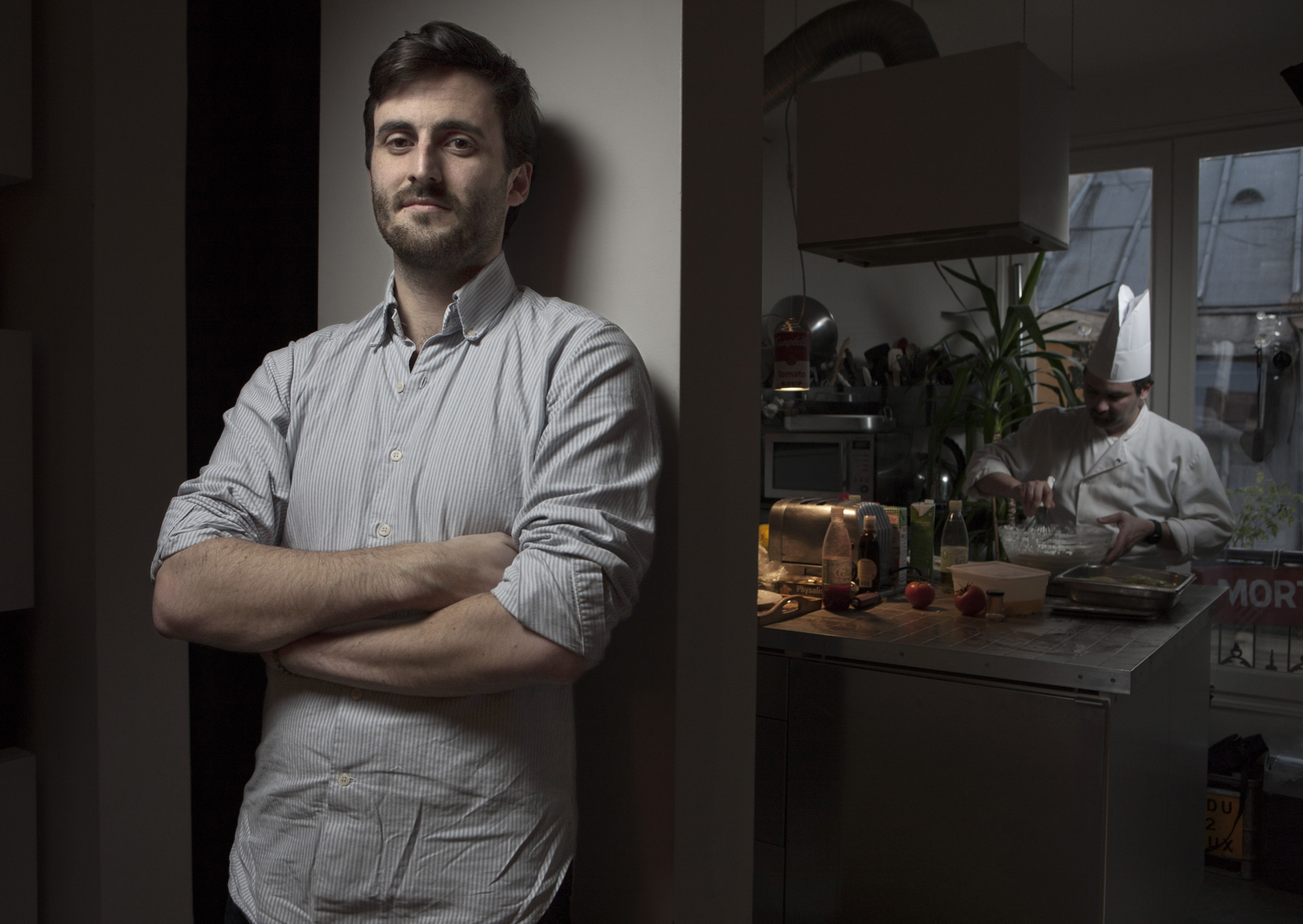When Stephen Leguillon walks into a stylish apartment in Paris after a long day at the office, he barely seems to notice the dining table adorned with flutes of gently fizzing champagne, the aroma of freshly baked bread filling the room or the sound of clattering pans emerging from the kitchen. For Leguillon, this is work. The 26-year-old entrepreneur and seven others are attending a dinner at the home of a French artist where they will decide whether chef Raphaël Robert, currently hard at work in the apartment’s kitchen, is good enough to join the ranks of the 554 freelance chefs currently working for Leguillon’s company.
Leguillon is the CEO of La Belle Assiette (LBA), a French startup launched in March 2013 that allows customers to book a chef online to cook in their homes just 24 hours in advance. For as little as $39 per head the chef buys the ingredients, prepares and serves a meal, and even washes up afterward. “The only thing you need to do is open the door and welcome people,” says Leguillon, who recognized that people loved entertaining at home but found the logistics of planning too difficult if they worked long hours.
La Belle Assiette, which means The Beautiful Plate, promises its freelance chefs greater rewards too. “For me, cooking is really about the pleasure of creating and sharing with others, so what I like about La Belle Assiette is the proximity to the client,” says Robert. The chef has worked in Parisian restaurants for more than 25 years but he still needs to impress at this evening’s validation dinner, the final step in the company’s tough selection process. (LBA accepts less than a quarter of chefs who apply. Robert made the cut.)
The Franco-Irish Leguillon set about trying to disrupt the food industry a few years ago, inspired by how Uber and Airbnb had used technology to challenge the taxi and hotel industries. He and LBA co-founder Giorgio Ricco, an Italian he met at business school in Paris, saw the current restaurant model as broken and exploitative: chefs work notoriously long hours for wages well below the national average. Few can afford to open their own restaurant, especially with the price of real estate skyrocketing in cities like Paris.
LBA’s proposition to chefs is simple: choose your own hours, prices and menus and in return for a 12% cut, the company can double or even triple your average monthly salary, while handling the business side of client bookings and billing. LBA has competitors, particularly in the U.S., but Leguillon has quickly seen the results of building his brand around France’s world-renowned culinary standards. “We even chose a name for the company that couldn’t be any more French,” he says. (LBA chefs make a wide range of international cuisines, not just French.)
Since launching two years ago, Leguillon has rapidly exported his brand to Belgium, Switzerland, Luxembourg, the U.K. and Germany, keen to solidify LBA’s lead in the European market before its American competitors make moves on this side of the Atlantic.

“Stephen has a clear vision of what he wants to achieve and a great way of explaining and sharing it,” says Guillaume Cuvelier, founder of Svedka Vodka and one of LBA’s first investors. LBA has raised $1.9 million in funding and quadrupled its client base over the first quarter of 2015 to reach more than 7,000 customers.
That success only came after Leguillon and Ricco, 28, spent 18 months working for free and testing six different business models, including delivering food from chefs’ homes to clients around Paris on their own bikes. Although the French government is now doing more to nourish its startup ecosystem, the pair were starting out at a time when high levels of unemployment, complex labor laws and excessive red-tape all made France a less than ideal environment for launching a business.
Despite that, Leguillon still managed to persuade others to share his vision. Twenty-one-year-old Franck Mithieux had never planned on staying in the startup world when he joined LBA in March 2014 for a six-month internship. “I just really fell in love with the concept,” he says, explaining his decision not to return to Paris’s Sorbonne University for a masters degree and stay at LBA instead. “I was learning a lot more here than at school. Stephen has always pushed me to go beyond my limits, to learn how to do things better and faster.”
It was after failing to grow his first business (an online takeaway company) quickly enough while at university that Leguillon acquired a more confident attitude to risk-taking. “Rather than being too cautious, you better make mistakes, make sure those mistakes aren’t too costly, and go learn as fast as possible,” he says, explaining why he and Ricco decided to open LBA in Belgium just nine months after its initial launch in France. Leguillon likens the experience of running a startup to building a rocket ship, promising his team will gain a great deal of experience if they hang on. “My job now is to make sure that this rocket ship takes off.”
- The 100 Most Influential People of 2024
- The Revolution of Yulia Navalnaya
- 6 Compliments That Land Every Time
- What's the Deal With the Bitcoin Halving?
- If You're Dating Right Now, You're Brave: Column
- The AI That Could Heal a Divided Internet
- Fallout Is a Brilliant Model for the Future of Video Game Adaptations
- Want Weekly Recs on What to Watch, Read, and More? Sign Up for Worth Your Time